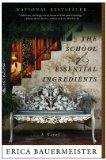Summary | Excerpt | Reading Guide | Reviews | Beyond the Book | Readalikes | Genres & Themes | Author Bio

And so Lillian drew back, regrouped, and gave her mother
food to fit the book of the day. Porridge and tea and scones,
boiled carrots and white fish. But after three months, Charles
Dickens finally gave way to what appeared to be a determination
on her mother’s part to read the entire works of Henry
James, and Lillian despaired. Her mother may have changed
literary continents, but only in the most general of senses.
“She’s stuck,” she told Elizabeth.
“Lily, it’s never going to work.” Elizabeth stood in front of
her mirror. “Just boil her some potatoes and be done with it.”
“Potatoes,” said Lillian.
A fifty-pound sack of potatoes squatted at the bottom of
the steps in Lillian’s basement, ordered by her mother during
the Oliver Twist period, when staples had begun appearing
at the door in such large quantities that neighbors asked Lillian
if she and her mother had plans for guests, or perhaps a bomb
shelter. If Lillian had been younger, she might have made a fort
of food, but she was busy now. She took her knife and sliced
through the burlap strings of the bag, pulling out four oblong
potatoes.
“Okay, my pretties,” she said.
She carried them upstairs and washed the dirt from their
waxy surfaces, using a brush to clean the dents and pockets.
Elizabeth always complained when her mother made her
wash the potatoes for dinner, wondering aloud to Lillian and
whoever else was near why they couldn’t just make a smooth
potato, anyway. But Lillian liked the dips and dents, even if it
meant it took more time to wash them. They reminded her of
fields before they were cultivated, when every hillock or hole
was a home, a scene of a small animal battle or romance.
When the potatoes were clean, she took down her favorite
knife from the rack, cut them into quarters, and dropped
the chunks one by one into the big blue pot full of water that
she had waiting on the stove. They hit the bottom with dull,
satisfying thumps, shifting about for a moment until they found
their positions, then stilled, rocking only slightly as the water
started to bubble.
Her mother walked into the kitchen, the Collected Works of
Henry James in front of her face.
“Dinner or an experiment?” she asked.
“We’ll see,” replied Lillian.
Outside the windows, the sky was darkening. Already
cars were turning on their headlights, as the light fi ltered grayblue
through the clouds. Inside the kitchen, the hanging lamps
shone, their light refl ecting off the bits of chrome, sinking quietly
into the wooden countertops and floor. Lillian’s mother
sat down in a red- painted chair next to the kitchen table, her
book open.
“I remember,” Lillian’s mother read aloud, “the whole beginning as a succession of flights and drops, a little see-saw of the right
throbs and the wrong. . . .”
Lillian, listening with half an ear, bent down and took
out a small pot from the cabinet. She put it on the stove and
poured in milk, a third of the way up its straight sides. When
she turned the dial on the stove, the flame leaped up to touch
the sides of the pan.
“There had been a moment when I believe I recognized, faint and
far, the cry of a child; there had been another when I found myself starting
as at the passage, before my door, of light footsteps. . . .”
The water in the big blue pot boiled gently, the potatoes shifting
about in gentle resignation like passengers on a crowded bus. The
kitchen filled with the warmth of evaporated water and the smell
of warming milk, while the last light came in pink through the
windows. Lillian turned on the light over the stove and checked
the potatoes once with the sharp end of her knife. Done. She pulled
the pot from the stove and emptied the potatoes into a colander.
“Stop cooking,” she said under her breath, as she ran cold
water over their steaming surfaces. “Stop cooking now.”
From the prologue to The School of Essential Ingredients by Erica Bauermeister. Copyright Erica Bauermeister 2009. All rights reserved. No part of this book maybe reproduced without written permission from the publisher.
Your guide toexceptional books
BookBrowse seeks out and recommends the best in contemporary fiction and nonfiction—books that not only engage and entertain but also deepen our understanding of ourselves and the world around us.